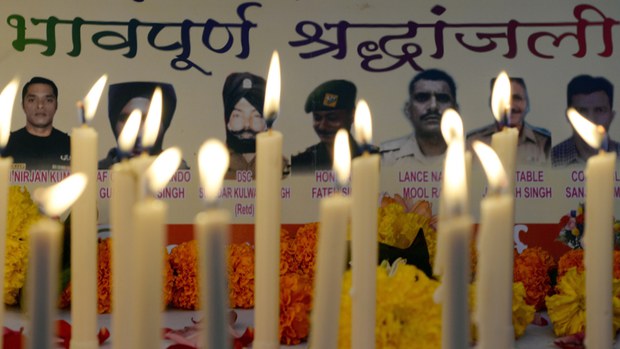India Presses China to Allow UN to Declare JeM Chief a Terrorist
2017.01.12
New Delhi
 Candles are lit during a vigil in Mumbai for seven Indian security personnel killed during an attack by militants at an air force base in Pathankot, in Indian Punjab, Jan. 6, 2016.
Candles are lit during a vigil in Mumbai for seven Indian security personnel killed during an attack by militants at an air force base in Pathankot, in Indian Punjab, Jan. 6, 2016.
India is making all-out efforts to persuade China to review its decision of repeatedly blocking an Indian proposal for the U.N. to declare the chief of Pakistan-based militant outfit Jaish-e-Muhammad (JeM) a global terrorist, the foreign ministry’s spokesman told BenarNews.
In April 2016, India moved a resolution in the United Nations Security Council that Masood Azhar be added to the U.N.’s list of terrorists, but China suspended the action using a technical hold, a move perceived to indirectly support its close ally Pakistan, where Azhar lives and moves freely.
Then on Dec. 30, China used its Security Council veto to block this resolution, meaning that New Delhi has to move a new resolution.
“We are examining all options. We are talking to other members of the United Nations Security Council, including the United States, United Kingdom and France. All avenues are open. Talks with China are still on to try to persuade it to reverse its decision,” said Vikas Swarup, spokesman for the Indian Ministry of External Affairs.
Of the 15 U.N. Security Council members, China alone objected to India’s petition. Beijing last week defended its stance, calling it “professional and objective.”
“We have taken a responsible and constructive part in relevant discussions in a professional and objective way. The purpose of China to put forward a technical hold on that issue is to create enough time for the committee and relevant parties to consult with each other on the relevant issue,” Chinese foreign ministry spokesman Geng Shuang told reporters in Beijing.
He was responding to accusations by New Delhi that China was adopting a double-standard in fighting terrorism.
JeM blamed for attacks on Indian soil
In 2001, the Security Council blacklisted JeM for links to al-Qaeda, but the group’s chief, Azhar, was exempted. If added to the U.N.’s list of terrorists, his assets would be frozen and he would face a global travel ban.
In 1999, the Indian government was forced to release Azhar, who then belonged to an outfit called Harkat-ul-Mujahideen, in exchange for about 190 passengers of hijacked Indian Airlines flight 814 following a weeklong standoff.
A year later, Azhar formed JeM, which, together with Lashkar-e-Taiba (LeT), is accused of orchestrating the 2001 attack on the Indian parliament that killed 14 people, including five attackers.
India has also accused JeM of carrying out a deadly attack on the Pathankot airbase in northwestern India’s Punjab state last January. The assault left seven Indian security personnel dead.
‘Simply irrational’
Foreign policy analysts warned of a “global fallout” if China failed to reverse its decision.
“The global community is now more concerned on terrorism, especially after the emergence of Islamic State. There is a threat of attacks all around the world. China’s decision to block India’s bid to declare Azhar a terrorist means that China is supporting terror syndicates,” former Foreign Secretary Kanwal Sibal told BenarNews.
“China has become complicit with Pakistan in the use of terror despite knowing that Azhar was freed in exchange for innocent lives of the hijacked aircraft and that his organization was declared a terror outfit. It’s simply irrational on China’s part to not declare him a terrorist,” Sibal said.
If China did not reverse its decision, bilateral ties would take a severe hit, Sibal added.
Veena Sikri, a former Indian ambassador to Bangladesh and Malaysia, echoed Sibal’s views.
“China’s decision has to be seen as a hindrance in the global fight [against terrorism], much more than in the Sino-Indian context. Certainly in India, it’s greatly disappointing because counter-terrorism is a vital issue on which all think-tanks, political parties and the civilian community are united,” she told BenarNews.
China’s blockade of India’s bid would affect the process of talks initiated by Prime Minister Narendra Modi between the two countries, which fought a full-scale war in 1962, said Vinay Kaura of the Center for Peace and Conflict Studies.
“It is going to have a very negative impact on bilateral dynamics. The Chinese side is still very determined to hold its position, and this is not a good sign,” Kaura told BenarNews.
“There is a divide in the international community over the definition of terrorism. China is taking advantage of that divide,” Kaura said.
Then there’s Tibet
Terrorism, however, is a relative side issue in bilateral relations between Asia’s two giants. China’s territorial claim over Tibet dominates Sino-Indian tensions.
Geo-strategist and author Brahma Chellaney said India needs to take a bolder stance in its diplomacy with China and not be so “accommodative” such as over the Tibetan issue, otherwise this could encourage “dangerous Chinese adventurism.”
“The way for India to reclaim its Tibet leverage is to start emphasizing that its acceptance of China’s claim over Tibet hinged on a grant of genuine autonomy to the region,” Chellaney wrote in the Nikkei Asian Review on Jan. 6.
“[A] braver Indian approach would include showing Tibet in its official maps in a different color from the rest of China and using expressions such as ‘the Indo-Tibet border,’ instead of ‘the India-China border.’ Using measures such as this, India can subtly reopen Tibet as an outstanding issue without having to renounce formally any of its previously stated positions,” he added.







